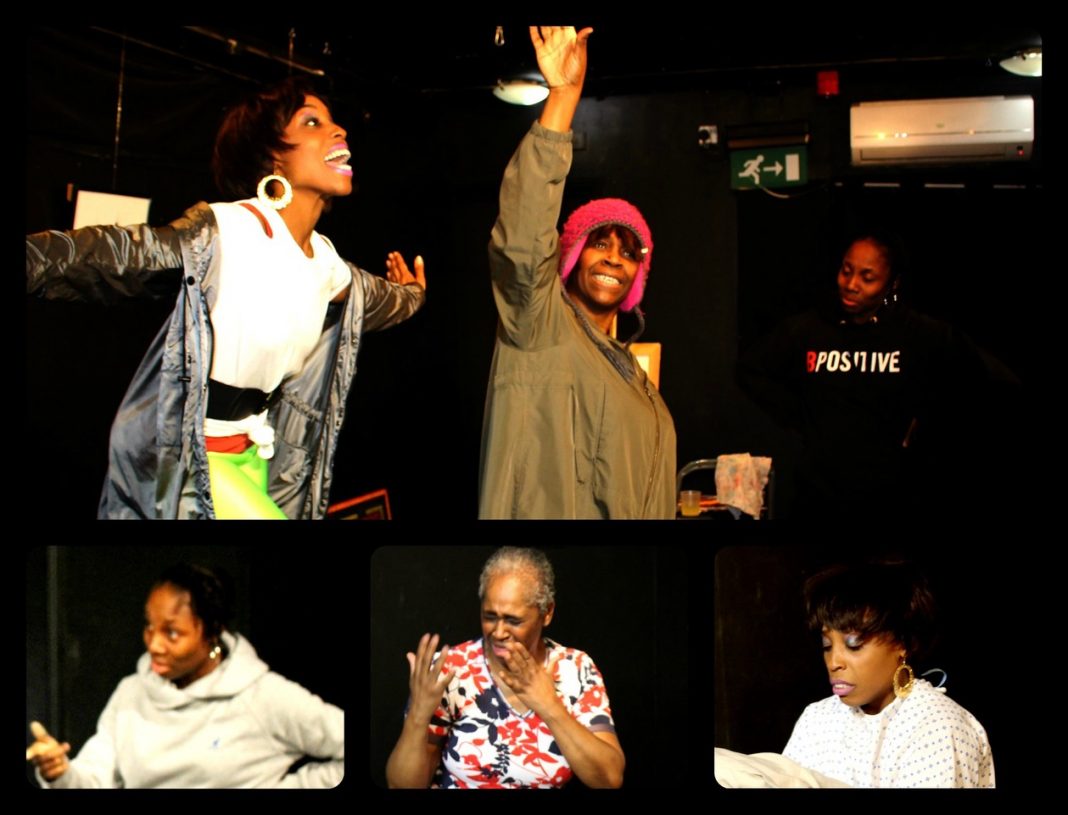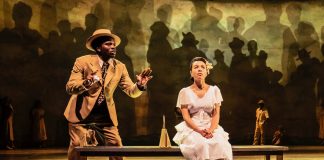Behind the Canvas is a tale of Faith (Collette Zacca), a middle-aged black woman with mental-health and homelessness issues, who is being paid to pose for a portrait, as part of a gallery’s interactive arts programme; or, as Faith, herself describes it, an “arts installation thingy”.
This three-hander has a lot going for it
The artist assigned to paint her is App (co-writer Lola Remi), a younger black woman who initially seems intent only on ‘getting on with’ the sitting. These ambitions, however, are constantly stymied by Faith’s increasingly erratic behavior, brought on by her fractured mental state and apparent A.D.H.D. issues.
To aid in the ‘interactive’ aspect of the installation, real-life audience members are asked, by App, to read out pre-determined questions for Faith. They include: What gets you up in the morning?
Are you happy?
What’s your favourite song?
What food can you not do without?
What’s your standout memory from childhood?
App’s increased agitation, in the face of Faith’s frustrating responses, make it clear that there might be more to this ‘arty transaction’ than meets the eye. Indeed, as the last question is revealed (“Why have you come here?”), so is the true nature of the pair’s ‘relationship’.
It is unfortunate that, what was initially an interesting 4th-wall breaking conceit designed to transition from one state to another, is summarily disregarded and/or papered-over in act 2.
It seems to me that, if a play sets up an audience-within-an- audience ploy, the writers should design a theatrical mechanism by which it can work throughout its length, or – at least – let us know why/when it ceases. Where the ‘4th wall breaking’ works better is through Ms. Zacca’s entertainingly edgy, immersive portrayal of Faith, and in the other on-stage presence.
To whit, Alter Ego (played by co-writer Shakella Dedi) reveals herself to be Faith’s ‘Queen of Sanity’; acting as childlike playmate, empathetic confidant, audience-bothering trickster, and reassuring ‘voice of reason’ in equal measure.
Initially played as a comedic sidekick, it is she who delivers the shocking 3rd-act soliloquy, revealing just how she (Faith) got to this point. It is a well-calibrated arc by Shakella, charting – as it does – the steep descent from triumph to tragedy, and reminding us of just how thin the line can be.
There is no doubt that, as a vehicle to further present these ideas through education and outreach, this play has potential.
The lighting is spare, and the music is both evocative (Miles Davis’ jazz classic ‘All Blues’ as recurring motif), and a bit too on-the-nose (Gnarles Barkley’s ‘Crazy’). Due to some glaring inconsistencies in both structure and narrative, I was unable to enjoy it as a piece of pure theatre as much as I’d hoped. That having been said, this three-hander has a lot going for it.
It deals with the growing national mental-health and homelessness crises – especially among those of African or Caribbean descent – in a way that is both visceral and, at times, emotionally affecting. It also addresses the disconnection and eroded sense of identity a child might feel as a result of being raised – or partly raised – within the British Care System.
I must admit to being moved at certain points in the piece, and there is no doubt that, as a vehicle to further present these ideas through education and outreach, this play has potential.

























